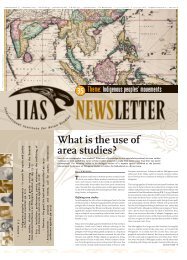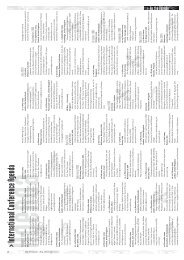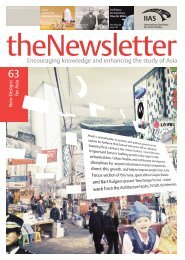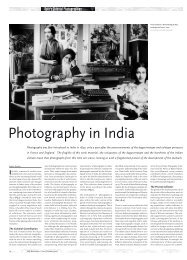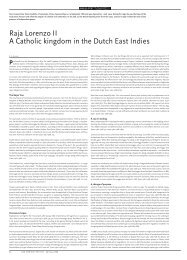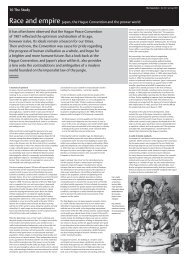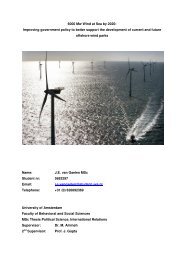Sex, love and revolution - IIAS
Sex, love and revolution - IIAS
Sex, love and revolution - IIAS
You also want an ePaper? Increase the reach of your titles
YUMPU automatically turns print PDFs into web optimized ePapers that Google loves.
R E V I E W<br />
Chinese Cyberspaces: Technological Changes <strong>and</strong> Political Effects. 2006. Jens Damm <strong>and</strong> Simona Thomas, eds. London, New York: Routledge, 180 pages. ISBN 0 415 33208 7<br />
The Internet in China: a liberating force?<br />
Ruth Cherrington<br />
If you are seeking information about<br />
the key issues <strong>and</strong> trends of Internet<br />
development in China, the second largest<br />
national cyberspace in the world, then<br />
this book provides a good starting point.<br />
Much of what is said here is already history:<br />
such is the danger of writing about<br />
the fast developing world of cyberspace.<br />
The number <strong>and</strong> profiles of users <strong>and</strong> the<br />
official countermeasures deployed to control<br />
them change daily. What might have<br />
appeared as a ‘hot topic’ (a somewhat<br />
over-used term in several chapters) in the<br />
early 2000s, when most research for this<br />
book was carried out, is by now superseded<br />
by something else.<br />
However, there is still much valuable<br />
material here that makes the book worth<br />
reading. Most chapters address the struggles<br />
<strong>and</strong> compromises between the state,<br />
at both the local <strong>and</strong> national levels, <strong>and</strong><br />
business, both national <strong>and</strong> international,<br />
as well as the impact of globalisation.<br />
Questions about e-commerce <strong>and</strong> e-government<br />
<strong>and</strong> the controversial subjects of<br />
content <strong>and</strong> censorship are also raised,<br />
while who, or what, is leading the race into<br />
cyberspace in contemporary China is an<br />
underlying theme throughout.<br />
Internet user <strong>and</strong> debunk the idea that<br />
the Internet is a ‘liberating’ force: whilst<br />
the number of users runs into the tens of<br />
millions, they hardly represent the whole<br />
population. Internet access remains limited,<br />
<strong>and</strong> most users are young, male <strong>and</strong><br />
likely to be living in large cities or developed<br />
coastal regions.<br />
One of the most pertinent chapters<br />
in terms of newsworthiness is Johan<br />
Lagerkvist’s ‘In the crossfire of dem<strong>and</strong>s:<br />
Chinese news portals between propag<strong>and</strong>a<br />
<strong>and</strong> the public’. Here we read about<br />
the increasingly important role played<br />
by bloggers or ‘netizens’ in news-gathering<br />
<strong>and</strong> dissemination. Technology <strong>and</strong><br />
globalisation have broken down strict<br />
controls over the traditional news media,<br />
Nina Hachigan. They address the impact<br />
of the P2P phenomenon on the balance of<br />
power between the state <strong>and</strong> its citizens.<br />
The basis premise is that P2P networks<br />
bypass centralised servers, thus providing<br />
freer networking <strong>and</strong> the possibility to<br />
exchange possibly contentious material<br />
<strong>and</strong> information. The researchers predict<br />
that ‘P2P technology will undermine the<br />
ability of authorities, be they corporations<br />
or governments, to control content or its<br />
distribution’ (p.65). They provide examples<br />
of citizens exchanging information about<br />
actual events in China, especially during<br />
times of crisis. For example, mainline users<br />
can read The Tiananmen Papers, which are<br />
deemed politically sensitive <strong>and</strong> yet have<br />
been made available to those linked to P2P<br />
networks. The researchers also raise inter-<br />
surveillance, self-censorship, the fear of<br />
getting caught <strong>and</strong> arrested is enough to<br />
deter some potential users from straying<br />
onto contentious sites, be they political or<br />
pornographic. And no matter how huge<br />
the Chinese Internet audience may seem,<br />
it is not a universal phenomenon; so many<br />
are still outside of this <strong>revolution</strong> because<br />
cyberspace is far from accessible to all.<br />
Not just politics<br />
Many Chinese, of course, don’t necessarily<br />
use the Internet because they’re<br />
obsessed with politics <strong>and</strong> want to see<br />
regime change. Several authors cite entertainment<br />
as motivating Internet use, a<br />
salutary reminder of what we ourselves do<br />
in the West when we access the Internet:<br />
chat with friends or strangers, view film<br />
provides commentary by Internet content<br />
producers, audiences <strong>and</strong> audience-producers.<br />
The book is also worth reading for<br />
the problems encountered while trying to<br />
conduct research on the Internet in China.<br />
For example, Jens Damm’s case studies of<br />
e-government in Guangdong <strong>and</strong> Fujian<br />
not only provide useful data about how<br />
local government uses new technology;<br />
they are also fine models of how to conduct<br />
such research.<br />
Some chapters would have benefited from<br />
drawing upon media <strong>and</strong> cultural theory<br />
more directly <strong>and</strong> comprehensively. The<br />
discussion of bloggers, netizens <strong>and</strong> P2P<br />
networks, for example, struck me as being<br />
quite relevant to Fiske’s uncited work on<br />
semiotic democracy. Readers must fill in<br />
The articles that comprise this volume can<br />
be seen as detailed snapshots of the situation<br />
in the early 2000s. In chapter one,<br />
editors Jens Damm <strong>and</strong> Simona Thomas<br />
provide a useful introduction with relevant<br />
background information about technological<br />
changes. Contextualising the Chinese<br />
Internet boom <strong>and</strong> how it might affect<br />
political arrangements, they acknowledge<br />
that the technological determinism view<br />
might prevail but explore some of the concrete<br />
social <strong>and</strong> political effects.<br />
Bloggers <strong>and</strong> P2P networkers: a<br />
‘netizen’ liberation force?<br />
In fact, politics is the main question at the<br />
centre of this edited volume: to what extent<br />
will the Internet’s rapid technological<br />
development bring about political change<br />
in China? Every chapter seems to address<br />
this question, which makes the book an<br />
engaging read. Under a still authoritarian<br />
regime, cyberspace might appear to be a<br />
democratic realm with ‘liberating’ effects<br />
on the populace. Some commentators<br />
argue that official controls over the media<br />
have already softened <strong>and</strong> see this as a continuing<br />
trend. Others, such as Chase et al.,<br />
write that, ‘Technology alone is unlikely to<br />
motivate political change in China’ (p.93),<br />
because more direct political changes are<br />
required to diminish centralised control.<br />
Technology might drive some changes,<br />
but on its own it cannot determine political<br />
reform in China.<br />
Eric Harwit <strong>and</strong> Duncan Clark focus on<br />
government policy <strong>and</strong> political control<br />
over the Internet over the past decade.<br />
They provide quality background information,<br />
facts <strong>and</strong> figures about the ‘typical’<br />
<strong>and</strong> the possibilities for ordinary citizens<br />
to present alternative versions of the news<br />
to official websites is explored here. Again,<br />
the key question about the web’s liberating<br />
effect is addressed but the conclusions are<br />
mixed. Web users exercise a degree of selfcensorship<br />
<strong>and</strong> discipline their use of sites<br />
that might be deemed controversial or as<br />
containing unacceptable material. It would<br />
appear that old habits die hard <strong>and</strong> the<br />
fear of punishment can be enough to limit<br />
cyberspace freedom. Additionally, Lagerkist<br />
concludes that the general public still<br />
trusts the official news media more than<br />
unofficial ones, though the wider Chinese<br />
audience outside of China, which is also a<br />
key player, undoubtedly differs.<br />
Specific information on bloggers, ‘comrade<br />
to comrade networks’ <strong>and</strong> peer<br />
to peer (P2P) networks is presented by<br />
Michael Chase, James Mulvenon <strong>and</strong><br />
esting points about the limitations of P2P<br />
networks, including self-censorship <strong>and</strong><br />
official technological countermeasures.<br />
The conclusions are once again mixed:<br />
technology does create the potential for<br />
freer exchange of information among citizens,<br />
but some restraints remain <strong>and</strong> technology<br />
itself can be a limiting factor, such<br />
as slow Internet speeds <strong>and</strong> lack of access.<br />
Technological processes <strong>and</strong> networks are<br />
examined in perhaps too much detail, as<br />
the lay reader will find the excessive jargon<br />
difficult to absorb.<br />
All authors concur that the Internet has<br />
to some extent weakened some controls,<br />
as cyberspace is harder to police than<br />
traditional media. But they also cite the<br />
Internet’s limitations <strong>and</strong> how the government<br />
always finds a way to respond<br />
to technological advances. Surveillance<br />
remains in place, <strong>and</strong> sometimes self-<br />
clips <strong>and</strong> shows or download music. As<br />
Harwit <strong>and</strong> Clark point out, ‘many current<br />
chat groups seem to contain rather bl<strong>and</strong><br />
discussions’ (p.33). Sports, travel, games<br />
<strong>and</strong> food seem to motivate chat, rather<br />
than more serious topics. Simona Thomas<br />
addresses one of the key forces driving<br />
China’s Internet expansion, the desire to<br />
increase business <strong>and</strong> commerce, reminding<br />
us once again that the Internet is not<br />
only about politics. Meanwhile, Xie Kang’s<br />
relatively short ‘Industrialization supported<br />
by Informatization’ provides some<br />
good context, but reads as though out of<br />
place in this volume.<br />
The book in general offers examples of<br />
strong research methodology. Statistical<br />
data, surveys <strong>and</strong> samples are employed,<br />
<strong>and</strong> primary interview data is liberally featured<br />
in fields such as the media. The interview<br />
material is particularly valuable, as it<br />
theoretical gaps for themselves, as this is<br />
very much an issue-based <strong>and</strong> fact-finding<br />
project. Overall, however, the book will<br />
interest students <strong>and</strong> teachers of contemporary<br />
Chinese politics, culture, economics<br />
<strong>and</strong> media. It is also of value to general<br />
media studies researchers <strong>and</strong> scholars,<br />
because while the trends in China occur<br />
within their own specific circumstances,<br />
globalisation makes them applicable elsewhere.<br />
Those who want to know more<br />
about news media, entertainment <strong>and</strong><br />
politics in China, <strong>and</strong> those who desire<br />
insight on how to conduct such research<br />
for themselves, should read this book.<br />
Dr Ruth Cherrington is Teaching Fellow in<br />
Cultural <strong>and</strong> Media Studies at the Centre for<br />
Translation <strong>and</strong> Comparative Cultural Studies,<br />
University of Warwick.<br />
R.L.Cherrington@warwick.ac.uk<br />
3 6 I I A S N E W S L E T T E R # 4 8 S u m m e r 2 0 0 8



